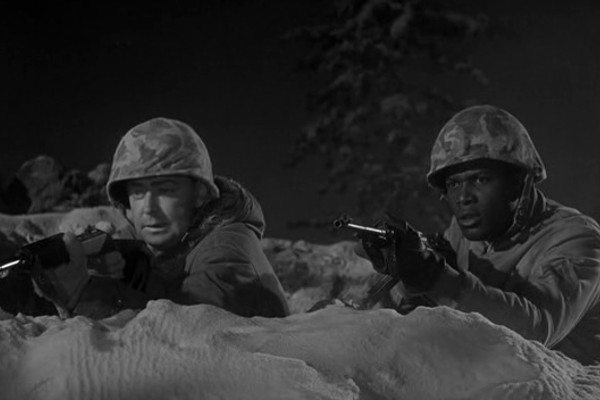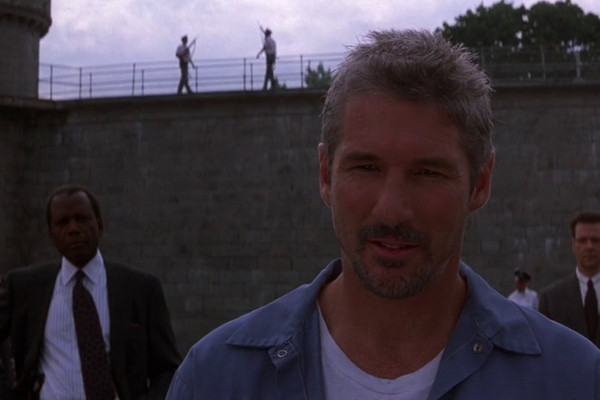

The films of Sidney Poitier are available via Amazon, including The Sidney Poitier Collection. However, to make searching for his films easier, every image in this article links to its product page on Amazon - simply click on the images to take you there if you wish to buy them. In the meantime, please join me as I rank all 51 of his films from worst to best...
Postscript, January 2022: Sidney Poitier sadly died on the 6th of January 2022. While changes to the wording of this article won't be made, it will continue to be maintained, and images updated when stronger sources become available. Screenshots from the BluRay of Red Ball Express have just been added. Created as an affectionate tribute to the actor, this old article will also get placed on the "front page" of the site for a few days in memoriam.
In 1977, Sidney Poitier quit acting to concentrate on directing. Having directed five of his own movies, he spent the 80s behind the scenes, most notably with the Wilder-Pryor comedy Stir Crazy. He was tempted back out of acting retirement in 1988, appearing in the films Shoot To Kill and Little Nikita. After this, he made ten further film appearances, eight of them television movies.
There's nothing essentially wrong with television movies, even though they may lack the scale and ambition of their cinematic counterparts. But in Sidney's case, what jars is seeing one of the biggest box office stars of the 60s, and a man who used his film work to break down racial barriers, suddenly acting in low-key, low budget offerings, all of which aired on that most cosiest of TV viewing days, a Sunday.
There came a point where Poitier became such a byword for dignity and nobility that it seeped into his films, and, in a "tell not show" rendition of events, characters began to speak of him in awestruck tones. The Simple Life of Noah Dearborn is a sickly sweet tale of a widower carpenter, rammed full of inexplicable lines like "Some say when God comes down to vacation on Earth, he stays at Noah's." Cloyingly sentimental, it is, thankfully, one of maybe just a handful of Poitier films that can be considered below par.

A languid collection of tired war film clichés, only enlivened in fits and starts. Conceived as a vehicle for Poitier, the makers could only get studio backing if a white star was involved, and so he shares co-billing with Alan Ladd. Any sense of purpose the film has is completely dispersed by the halfway point, whereby some of the gimmicky casting choices get to do "turns" in the middle of a perillious war mission. Completely alleviating any sense of tension are pioneering stand-up comedian Mort Sahl, delivering a comic monologue, and singer James Darren, in the middle of a life-or-death situation, deciding to get out his guitar and croon a song. Maybe the most eccentric casting choice in a turgid film was Swedish boxer Ingemar Johansson, the heavyweight champion of the world when the picture was shot. Perhaps unfortunately for the box office, he lost the championship in a rematch to Floyd Patterson two months before the film was released.
Poitier had actually served in the army in 1943. Just sixteen years old and directionless, he lied about his age and got enlisted, helping patients in military hospitals, before becoming disillusioned and attempting to get discharged by faking insanity. In real life as with film, it seems as if army life was a bit fit for the actor.
Poitier's last movie was directed by the same man behind Noah Dearborn, and again apes that film's sense of obvious sentiment. There's even plot similarities, whereby Sidney again plays a construction worker who uses his wisdom and nobility to fight back against inhuman industrialisation. It's pedestrian and full of platitudes, a low key and sadly missable ending to a once-stellar career. The following year Poitier was given an honorary Oscar for his contribution to the industry... a pleasing footnote from a medium that had begun to forget him.
It's difficult to think of a film so singular in intent as this one, whereby a young southern boy tells his uncle that he loves and wants to keep a stray dog. Repeatedly. For 95 minutes. With a mannered style of acting and antiquated speech patterns, Good-bye, My Lady is not only dated in a very bad way, but with the title giving away the ending, is also dramatically inert. Sidney, sandwiched in between much larger roles in Blackboard Jungle/Edge of the City, looks bored in a bit part, his three scenes amounting to less than seven minutes of the runtime.
In addition to a science fiction novel (Montaro Caine), Sidney Poitier wrote three autobiographies. The Measure of a Man: A Spiritual Autobiography (2000) and Life Beyond Measure: Letters To My Great-Granddaughter (2008) are fine, fine books and well worth a read. However, way back in 1980 he released his first autobiography, This Life, a book of astonishing frankness missing from the later works. In it Sidney unveils shockingly honest revelations, including losing his virginity at 13 years old to a prostitute for 50 cents; masturbating and catching STDs, and petty crime. However, perhaps the most shocking confession is his admission of the three partners he first attempted to lose his virginity to. One was a regular girl, but another was his own niece. The third partner? Let's just say that, Sidney's second scene in Good-bye, My Lady - where he talks almost exclusively about his ownership of chickens - can never be seen the same way again.
24 of Sidney Poitier's movies were based on existing stories, be it novels, plays, short stories (or, as in the case of The Slender Thread, a Life Magazine article). David and Lisa was based on a short story by psychiatrist Theodore Isaac Rubin, who wrote the script for this TV movie in collaboration with Eleanor Perry (the sole writer of the original 1962 movie production) and Lloyd Kramer (the director).
In terms of remakes, then this is a rarity for Poitier. The Lost Man was loosely based on the same source novel as Odd Man Out, but wasn't a strict "remake" as such. What harms David and Lisa is that the original movie, with Oscar-nominated direction, is so good. Featuring genuinely strange performances from Keir Dullea and Janet Margolin as two mentally ill teens, it's shot in stark black and white, and features expressionistic images, like the nightmare of David (Dullea) where a clock hand is being used as a guillotine in a giant clock face.
In contrast, while not bad, this TV remake takes all the left-field and off-kilter appeal of the original and retools it as a more easy-going soft romance for a cosy afternoon viewing. Gone is the dramatic music, and in its place everything is drowned in soft colours and even softer piano. Although the clock nightmare does still exist in the screenplay, it's more cheaply done and far less surreal. Sidney, in a largely reactive part, gets drippy lines likes "if you don't fall in love with life, you are more dead than alive", while the entire thing is introduced by Oprah Winfrey with such overbearing platitudes as a "timeless love story" and "love gives us the power to live." Poitier, at this stage in his career, adopts the "older statesman" role, frequently shorn of any edges throughout much of his 90s work. Although his acting is still fine, there's an element of hunger, of cockiness, in his earlier roles, a fire that he never regained once he achieved his maximum fame.
Lukas Haas and Brittany Murphy are fine in the lead roles, but they provide more relatable characters, just mixed up teens (helped by them being significantly younger than the stars of the '62 movie) who are in need of help. The original, in contrast, provided an air of danger. Although the film largely follows the same path as the original, it was made in an age where society is thankfully more understanding of mental illness, which makes it more comforting, but also less dramatic. Gone are scenes where a family abuse the patients at a train terminal, and David no longer gets a dysfunctional family background, just a single parent mother who genuinely cares about what's happening to her son, his father having died. Of note is that several male characters are altered into female ones, so that the jealously Lisa feels over David having another friend is more obviously romantic jealousy. The climax – that love helps both patients get over deep-seated mental health issues – feels far more contrived in a presentation that's so geared towards being "heart-warming", rather than an off-beat movie where such a perhaps-unlikely resolution grows more easily out of a narrative that deliberately sets out to distance the viewer.

Loosely based on the 1973 film The Day of the Jackal, this update sees Bruce Willis travelling the globe as the titular assassin, looking like Bruce Willis hamming it up in a variety of unconvincing wigs. Sidney Poitier plays an FBI Deputy Director out to catch him, and Richard Gere is, somewhat improbably, an ex-IRA soldier revealing all he knows about the Jackal in exchange for his possible freedom.
Critically panned upon its release, The Jackal perhaps stands up as reasonably diverting upon its twentieth anniversary. The plot is preposterous, the scenes frequently ludicrous, and the casting eccentric, from Jack Black to Leslie Phillips. Yet despite all this, it moves along at a reasonable rate, and, if approached as an unintentional comedy, is actually quite amusing. Sidney has a substantial role in the picture, though it was to be his last theatrical release.
It's astonishing just how quickly Poitier's stock fell. The biggest box office star in the world in 1967/68, with three major hits, he appeared in just one film the following year, this stagily-directed semi-farce. The movie, based on Poitier's own storyline, sees him play possibly his most dislikeable character, arrogant businessman Jack Parks, match-made against his will with a black maid seeking some form of personal empowerment. The film concludes with a title song, informing us that what that empowerment amounts to is the need for love. Although the film touches on themes of emancipation and black pride over the course of its runtime, it turns out all the titular Ivy needs in her life is a man.
However, such flaws are perhaps not always that of the movie; this was the first depiction of a romantic relationship between a black man and woman in mainstream Hollywood, and was quite groundbreaking for its time. Chief matchmaker Beau Bridges does the best with what he's got as a representative of the 60s counterculture, but his stoner fixations seem today, like the main subtext of the movie, somewhat quaint and parochial; patronising rather than groundbreaking. Yet this was a different time, and the film must be judged as such, with women's liberation still in its relative infancy.